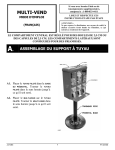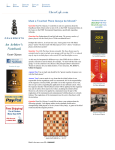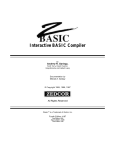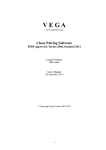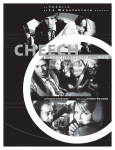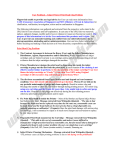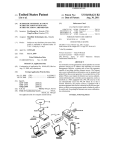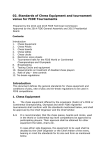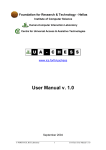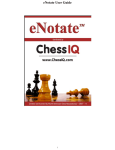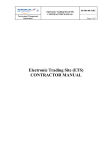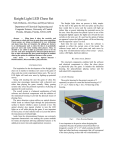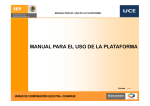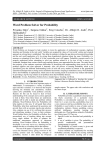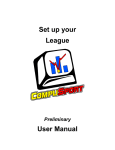Download An Arbiter`s Notebook - Arbitri
Transcript
An Arbiter's Notebook MonRoi and Other Matters The September column featured two questions about the MonRoi PCM (reprinted below) and this month we have a follow-up from Mrs. Zeljka Malobabic at MonRoi Customer Support: An Arbiter's Notebook Geurt Gijssen Question Dear Mr. Gijssen, there was a problem during the 2006 Quebec Open involving the MonRoi PCM. The organizers supplied the PCM to both players on the top boards and a technician explained how to operate it prior to round one. Unfortunately, those explanations were only made in English; not a wise choice for a FIDE rated tournament with foreign players. Because of the language barrier, one player did not even understand that use of the PCM was voluntary and that a paper scoresheet would have been acceptable. He also did not understand how to display the full game score on the PCM. The real problem occurred in a game where this player, as Black, unexpectedly stopped playing at move 39 and let his flag fall in a trivially won position. This happened because the PCM was displaying line 40 of the scoresheet, and the player thought that he had made move 40. The arbiter did not accept White’s time forfeit claim and gave Black one extra minute and ordered the game to continue. White appealed the decision and the game continued under protest. In appeal, it was immediately obvious that White won the game in accordance with Article 6.10, but this was not the primary issue discussed there. As it is written in the Chess Organizer’s Handbook, an Appeals Committee is not bound by the Laws of Chess in search of a fair solution. Although usually what happens on the chessboard is more important then what happens off of it. Anyway, the Appeals Committee upheld the arbiter’s decision, since the player was not at fault because of the language barrier, and White soon resigned the game. Pierre Denommée (Canada) Answer As a matter of fact, you did not ask me a question or for any comment; nevertheless, I will give you my opinion. It is clear that something was wrong with the explanation being given in only one language, but why did the players accepted this? They could have asked for a translation. So it was not only the technician who was at file:///C|/cafe/geurt/geurt.htm (1 of 7) [12/19/2006 12:17:56 PM] An Arbiter's Notebook fault. With this in mind, the decision of the Appeals Committee is very reasonable. Question Dear Sir, I have a few questions concerning the MonRoi PCM device: ● ● ● ● ● There is a mode wherein it will alert a player to an illegal move. Could you comment on this? In the 2006 Quebec Open, a player of the black pieces lost on time, but appealed that he was confused by the PCM display and his appeal was upheld. Do you agree with this decision? The device can display the position from the opponent’s point of view. Should this be allowed? Please bear in mind that sometimes only one player is using the device, while the other has a paper scoresheet. What would happen if a player had technical problems with the device? Would he be obliged to address this problem in time trouble if he was playing with increments? Do you have any other comments to share on this new technology? Sincerely, Neil Sullivan (Canada) Answer 1. I do not see any problem with this mode in normal games, see Article 7.4 of the Laws of Chess: If during a game it is found that an illegal move has been completed, the position immediately before the irregularity shall be reinstated. As you can see, the article makes no mention of how the illegal move was found. Note that the illegal move had already appeared on the board. However it is possible that a move is legal, but the notation or input is illegal. The situation is different in Rapid and Blitz games, and use of the MonRoi device should be forbidden, because nobody is permitted to indicate that an illegal move was made, not even the arbiter. 2. See my answer to the above letter. 3. It is difficult to answer this question, but I came to the conclusion that it is not completely correct to offer such an opportunity, although the opponent, who uses a “normal” scoresheet, can do the same by walking to the other side of the table. The most important element to me was the fact that the MonRoi PCM should only be used as a scoresheet in this situation. The opportunity to flip the board should only be allowed once at the start of the game, and only to the player with the black pieces. I will contact MonRoi about this matter. file:///C|/cafe/geurt/geurt.htm (2 of 7) [12/19/2006 12:17:56 PM] An Arbiter's Notebook 4. If it is really a technical problem that cannot be solved on the spot, the player can switch to a paper scoresheet. 5. These issues should be discussed by a special Committee and the Laws of Chess will have to be adapted or some changes made to the device. Question 1 Hello Mr. Gijssen, Regarding the question from Mr. Denommée: The use of the MonRoi PCM during the Quebec Open was optional, yet 75% of the players chose the PCM over a paper scoresheet. User instructions were given in two languages: in English by the MonRoi engineer and in French by the Quebec Chess Federation. There were three strong international players in attendance, who all speak English very well: Ghate Swati, Abhijit Kunte and Alexander Moiseenko. The incident in question occurred in the game between Hajiyev Elshad from Ontario, Canada (a non-FIDE rated player) and Stephane Depuis from Quebec, Canada (FIDE rated 2183). As both players are from Canada, there surely was no language barrier. The MonRoi PCM is very simple to operate and the players were provided equal access to the PCM User Manual, which was also published on the home page of the tournament website. The players were instructed how to display the full gamescore on the PCM and the last move made is visible below the chessboard recording screen. When the black notation space next to move 40 is empty – it means that Black did not record move 40. The same applies when using a paper scoresheet. Question 2 Regarding the question from Mr. Sullivan: When the central system is installed, the Chief Arbiter has the option to enable or disable Chess Rules in the PCM. If you disable Chess Rules, say for rapid games, then it is possible to input illegal moves in the PCM. In Blitz games, it is not necessary to record the moves, so there is no need to use the PCM. The position of the chessboard can be automatically locked, but the ability to rotate the board does not assist the player in any way. Over 10,000 games have been recorded and broadcast with the MonRoi PCM without any issues. The system is certified by FIDE, USCF and ECU, and many top tournaments are implementing the MonRoi system. However, we are open to suggestions as to how we could make the MonRoi system even better. Are the Laws of Chess and tournament rules and regulations published in other languages than English? Are players expected to speak English in FIDE tournaments? Thank you in advance. Best regards, Zeljka Malobabic (Canada) file:///C|/cafe/geurt/geurt.htm (3 of 7) [12/19/2006 12:17:56 PM] An Arbiter's Notebook Answer 1 I was not present at the event. Nevertheless, given the two letters that I received, it can be surmised that something went wrong, if not with the PCM, then at least with the explanation before the tournament. The fact that both players are Canadians does not automatically mean they speak or understand English. For instance, Belgium is a country with three official languages, yet some residents are only fluent in one of them. Your remark regarding the empty notation space is clear. Answer The option of turning the Chess Rules off solves the problem mentioned in my previous answer. But what if the games are played without using a central control system? Can a player then change the option on or off? If the answer is “Yes,” then it is reasonable for the Rules and Tournament Regulations Committee to discuss the arbiter’s obligations in that situation. I agree that there is no need to record the moves in Blitz games, or in Rapid games for that matter, but it is not forbidden to record the moves. It is debatable as to whether a player benefits from being able to flip the board position, but the ability to lock this option will likely avoid some arguments. No device is perfect and it is only understandable for arbiters to be prepared in case something goes wrong. So the Laws of Chess should try to cover as many scenarios as possible. In fact, when the current rules refer to a “scoresheet,” it is referring to a piece of paper (see Appendix E). The Laws of Chess are published in many languages. Individual federations usually provide translations in their own language and some even translate the whole FIDE Handbook. However, each tournament handles language barriers in their own way. It depends where the tournament takes place, who is the chief arbiter, and whether interpreters are available, etc. For instance, at the Olympiad in Turin the announcements were in English, Italian and sometimes Russian. At the Aeroflot tournament in Moscow, announcements were in English, Russian and sometimes German. Question If White plays 1 a4 in the following position, Black could normally capture en passant, but here he cannot. file:///C|/cafe/geurt/geurt.htm (4 of 7) [12/19/2006 12:17:56 PM] An Arbiter's Notebook If this position were to occur two more times, can the side on move then claim a draw? The positions are technically different, but the set of legal moves is the same. Does Article 9.2, in referring to “possible moves” include moves that one side might (erroneously) think it could make? In a Blitz context, an error is possible and the consequences might be significant. Regards, Guy Haworth (UK) Answer This situation is analogous to what we discussed in Dresden 2005 regarding castling. Let’s look at the following position. Black is on move and White hasn’t moved his king or rooks: Play continues 1…Qg3+ 2. Ke2 Qg4+ 3.Ke1 Qg3+ 4.Ke2 Qg4+ 5.Ke1 and now if Black claims a draw before playing 5.Qg3+, it would be ruled as incorrect because White had not lost his right to castle by 1…Qg3, but by playing 2.Ke2. In general, a player loses his right to castle with his own move and not by an opponent’s move. In the same way, when the position appears on the board for the third time in your example, the claim is not correct because Black lost the right to capture en passant when he had to play his first move. Question Hello Mr. Gijssen, the following situation arose during a 15 minute tournament. Each player had about 15 seconds remaining. White’s king was on g5, and Black had pawns on g6, f7, and e6. The problem was that the f7pawn was, say, 90% on e7 and 10% on f7. Of course, White captured the g6pawn and Black called the referee to claim an illegal move. White did not remember that the pawn was actually on f7 and Black did not try to reestablish the pawn’s position. What decision seems appropriate in this case? The referee decided on a draw. Thanks in advance. Best regards, Manuel Wehmeier (Spain) Answer Apparently the f-pawn moved to e7 without anyone claiming an illegal move. Therefore, in my opinion the pawn is on e7. Question Dear Mr Gijssen, I would like a clarification between “made” and “completed” moves: file:///C|/cafe/geurt/geurt.htm (5 of 7) [12/19/2006 12:17:56 PM] An Arbiter's Notebook 1.1 The game of chess is played between two opponents who move their pieces alternately on a square board called a `chessboard`. The player with the white pieces commences the game. A player is said to `have the move`, when his opponent`s move has been made. 4.7.1 When, as a legal move or part of a legal move, a piece has been released on a square, it cannot then be moved to another square. The move is considered to have been made when all the relevant requirements of Article 3 have been fulfilled. 6.8a. During the game each player, having made his move on the chessboard, shall stop his own clock and start his opponent`s clock. A player must always be allowed to stop his clock. His move is not considered to have been completed until he has done so, unless the move that was made ends the game. Now let’s consider these definitions in the context of illegal moves. It’s clear from 4.7.1 that illegal moves cannot be “made,” because they do not fulfill the requirements of Article 3. If they cannot be “made,” then how can they be “completed”? This should be clarified. Otherwise, how would you interpret 7.4? Also, consider the implications of the first sentence of C3. C3. An illegal move is completed once the opponent`s clock has been started. The opponent is entitled to claim a win before he has made his own move. Now, suppose that during a Blitz game Player A places his king in check. Player B captures the king and stops the clock, but does not start Player A’s clock. Player B can still claim a win because he has not “made” a move. Since only legal moves can be “made,” an illegal move cannot be “made.” Refer to C3 above. Had Player B started Player A’s clock, his illegal move would have been completed and Player A could claim a win. Best regards, Martin Norbäck (Sweden) Answer You refer to Article 4.7.1, but it is actually Article 4.6. I think that you are completely correct. A new definition for Article 4.6 is needed. What do you think of the following? When a piece has been released on a square, it cannot be moved to another square. The move is then considered to be made. The move is called legal when all the relevant requirements of Article 3 have been fulfilled. If the move is not legal, another move should be made instead. If this proposal is accepted, we will have to check for any cross references. Comments are welcome. file:///C|/cafe/geurt/geurt.htm (6 of 7) [12/19/2006 12:17:56 PM] An Arbiter's Notebook Have a question for Geurt Gijssen? Perhaps he will respond to it in a future column. Send it to [email protected]. Please include your name and country of residence. Copyright 2006 Geurt Gijssen. All Rights Reserved. [ChessCafe Home Page] [Book Review] [Columnists] [Endgame Study] [Skittles Room] [Archives] [Links] [Online Bookstore] [About ChessCafe] [Contact Us] Copyright 2006 CyberCafes, LLC. All Rights Reserved. "The Chess Cafe®" is a registered trademark of Russell Enterprises, Inc. file:///C|/cafe/geurt/geurt.htm (7 of 7) [12/19/2006 12:17:56 PM]







